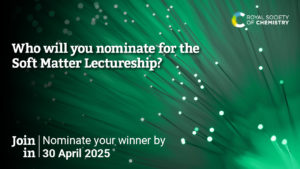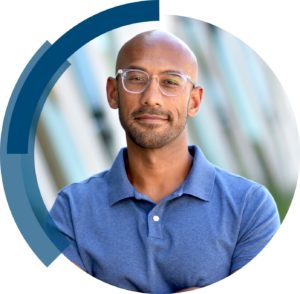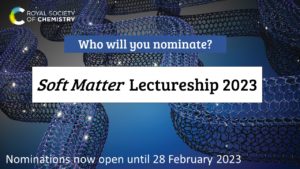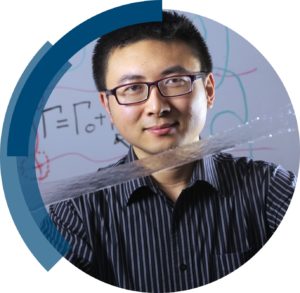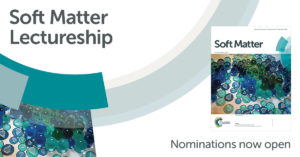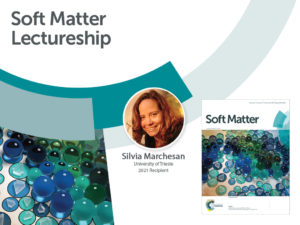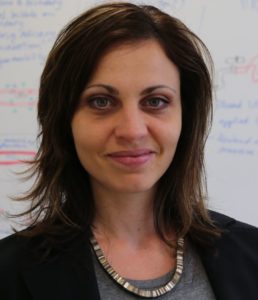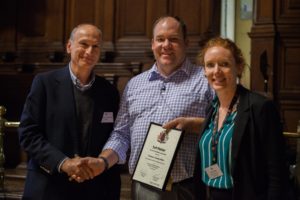It is with great pleasure that we announce Ankur Gupta (University of Colorado Boulder) as the recipient of the 2025 Soft Matter lectureship.
This award honours an early-career researcher who has made significant contribution to the soft matter research field. The recipient is selected by the Soft Matter Editorial Board from a list of candidates nominated by the community.
Ankur’s independent research has been featured in The New Yorker, CNN, Daily Mail, Newsweek, The Print, and over 100 other media outlets. His contributions have been recognized with numerous honors, including the Chemical & Engineering News Talented 12, Johannes Lyklema Early Career Award in Electrokinetics, Air Force Young Investigator Award, AIChE 35 Under 35, Dream Chemistry Lecture, NSF CAREER Award, Soft Matter Emerging Investigator Award, and the Graduates of the Last Decade (GOLD) Award from IIT Delhi.
Ankur is also deeply committed to teaching, mentorship, and scientific communication. He has received multiple teaching awards, including a college-wide honor for undergraduate instruction. He contributes to LearnChemE.com and is currently developing digital experiments to enhance student learning in undergraduate fluid mechanics. Ankur’s favorite part of the day is working with his students; he has one of the largest whiteboards in the department, and it serves as his most-used scientific tool. He enjoys learning from and arguing with his students, and believes that mentorship is about helping students become independent thinkers who challenge his ideas and reshape the direction of the work.
Ankur is an active member of the scientific community. He has peer-reviewed over 150 manuscripts across a wide range of journals. He has also served as a symposium chair at major conferences, including ACS Colloids, APS Division of Fluid Dynamics, AIChE, ACS Fall Meeting, and the U.S. National Congress on Theoretical and Applied Mechanics (USNCTAM). He regularly serves on scientific panels and reviews for different funding agencies. He is also co-editing a book for the Royal Society of Chemistry on the topic of diffusiophoresis.
Ankur grew up near Delhi, India, and moved to the U.S. for graduate school. His undergraduate training played a formative role in shaping his scientific path. At IIT Delhi, he was initially unfamiliar with the idea of graduate school until his undergraduate advisor, Prof. Shantanu Roy, recognized his potential and encouraged him to apply, an act that deeply influenced his academic journey. He met his wife at MIT, and the two consider Boston a special place in their heart. Outside of work, Ankur enjoys playing with his 1.5-year-old son, playing bullet chess, cooking and eating Indian food, and listening to old Bollywood music and ghazals.
Find out more about Ankur and his research in our interview below!
How has your research evolved from your first article to this most recent article?
I was fortunate to get my first taste of research as an undergraduate at IIT Delhi, where I worked on predicting flow patterns in bubble column reactors using multiphase CFD models and published my first paper. My undergraduate thesis advisor, Prof. Shantanu Roy, instilled in me the importance of being scientifically rigorous and detail-oriented, a lesson that continues to shape my research approach.
My early research focused on large-scale reactor modeling, but during graduate school at MIT, my work centered on small-scale multiphase flows. I combined experimental and computational approaches to study the formation of nanoemulsions and investigated whether their sizes could be predicted using correlations derived from microscale emulsions (turns out the answer is no, see our Soft Matter paper: https://doi.org/10.1039/C5SM02051D). My PhD advisors, Prof. Patrick Doyle and Prof. T. Alan Hatton, encouraged me to pursue my interest in theoretical and computational research. In the latter half of my PhD, I focused on the trapping of droplets in microchannels using geometric obstacles and wetting phenomena. Collaborating with an experimental PhD student in the Doyle group, I gained hands-on experience with analytical modeling and theoretical formulation. These interests led me to pursue postdoctoral research with Prof. Howard Stone at Princeton University, where I was introduced to electrokinetics. I learned about diffusiophoresis, electrical double layers, and wetting, and, crucially, how to pose and analyze theoretical problems in this space with clarity and depth.
Today, my research group at CU Boulder focuses on understanding fundamental interfacial and electrokinetic processes. We work across problems in electrochemistry, colloidal physics, and soft matter, bringing together analytical theory, continuum modeling, and modern computational methods. For instance, in our recent work on electrolyte transport in porous media (https://doi.org/10.1073/pnas.2401656121), we combined concepts from thin film analysis in fluid mechanics with ion transport theory to predict electrolyte dynamics across thousands of interacting pores, moving beyond the single-pore focus that dominates much of the existing literature.
My research has evolved significantly from large-scale multiphase flow modeling to a broader, interdisciplinary effort that draws from and contributes to soft matter, fluid dynamics, electrokinetics, and transport phenomena. The diverse set of tools and perspectives I’ve encountered, from CFD to experiments to theory, have taught me to distill the essence of complex phenomena into tractable, well-posed problems.
Looking ahead, I am excited to continue building a research program that explores soft matter and interfacial transport across a range of scientific domains. Whether in electrochemical systems, porous materials, or biological interfaces, I see a variety of opportunities for theoretical research to contribute meaningfully. I’m deeply grateful to the mentors, colleagues, and students who have helped shape this journey and continue to challenge and inspire my thinking.
What excites you most about your area of research and what has been the most exciting moment of your career so far?
What excites me most is how our work allows us to ask fundamental questions, yet also stumble onto completely new insights and practical applications, often in unexpected ways. Because of the interdisciplinary and multiscale nature of our research, we frequently work at the intersection of electrostatics, fluid mechanics, and soft matter physics. This naturally leads us into multiphysics problems that are full of surprises. We often run into results we hadn’t anticipated, and that keeps the work intellectually fresh and dynamic.
For instance, in a manuscript under preparation, we’re studying electrolyte transport through charged conical nanopores. I’ve worked on cylindrical pores for nearly seven years, and I was genuinely shocked (I still am) to discover that conical nanopores behave entirely differently; they are not simply interpolations between narrow and wide cylindrical pores. Stay tuned for those results! This kind of research keeps us on our toes and reminds us how many fascinating phenomena are hidden behind well-known mathematical equations.
It’s hard to pick a single most exciting moment, but I’ll share a serendipitous story that has become a defining part of my group’s recent work. We were initially curious about how diffusiophoresis behaves in two dimensions, which led to a paper we published in Soft Matter (https://doi.org/10.1039/D2SM01549H). At the time, we weren’t sure where to take the idea next – we were mostly just exploring different directions. Around then, a student in my group visited the Birch Aquarium in La Jolla, California, and was struck by a surprising sight: a male ornate boxfish undulating in the water, covered in tessellating violet and tangerine hexagons. It reminded him of the simulations he’d been running of two-dimensional systems shaped by a mixture of diffusiophoresis and Turing-like instabilities. This observation led us to coin the term Diffusiophoresis-Enhanced Turing Patterns (https://doi.org/10.1126/sciadv.adj2457). The work attracted widespread attention, including coverage in The New Yorker, CNN, Daily Mail, and over 40 media outlets, likely because of its fundamental nature and visual appeal.
But for me, the most meaningful response came in a different form, i.e., an email from an eighth-grade student in Connecticut who had read a news article and wanted to learn about my scientific journey. On another occasion, my mom read one of the news articles related to this work and told me that she finally understood what I do. These moments are deeply satisfying. They’re a reminder that our scientific work, which can sometimes feel like it’s unfolding in a vacuum, can resonate with others and help spark curiosity.
Finally, I would be remiss not to mention the day-to-day joy I get from my interactions with students and colleagues. Few things excite me more than seeing a student light up about their work, or getting an email from a colleague with a thoughtful comment about something we’ve published. That sense of shared discovery and intellectual companionship is what keeps me coming back every day. Ultimately, what excites me most is the privilege of exploring beautiful and often unpredictable ideas in soft matter and interfacial phenomena, and sharing that excitement with others.
In your opinion, what are the most important questions to be asked/answered in your field of research?
That’s a difficult question, and one that’s probably too vast to be answered by any single researcher. But from the perspective of my group’s current interests, I can highlight a few directions that feel both timely and foundational.
One area we’ve been deeply engaged in is electrolyte transport in porous materials. Over the past two decades, there’s been remarkable progress in understanding how ions move through confined geometries, especially in the presence of diffusivity asymmetries, multivalent ions, nonlinear electrostatics, and concentrated electrolytes. However, many foundational questions remain unanswered. For instance, is it possible to define a Darcy-like law for ion transport in porous networks, akin to what we have for pressure-driven flows in porous media? Such a formulation could bridge the gap between pore-scale physics and device-scale modeling. Additionally, real-world systems almost always involve electrolyte mixtures, yet most theoretical and computational efforts still focus on single-salt systems. Understanding how mixtures behave, i.e., how they interact with each other inside a porous medium, especially as they also might be undergoing Faradaic reactions, remains an open and practically relevant challenge. A parallel frontier is the integration of theoretical modeling with diagnostic tools for porous electrodes. Could we one day diagnose underperforming energy storage materials using impedance spectroscopy interpreted through rigorous continuum models? In our recent work on electrolyte transport in porous materials mentioned in #1, we combined thin-film analysis from fluid mechanics with ion transport theory to move beyond the single-pore picture, enabling predictions across thousands of interacting pores. This approach may offer a pathway toward mesoscopic models that still retain core micro- or nanoscopic insights.
A second theme that excites us is in the area of electrolytic diffusiophoresis, particularly how particle shape can influence pattern formation. Much of the literature, understandably, focuses on spherical particles, but shape offers an underexplored lever. In our recent work on Diffusiophoresis-Enhanced Turing Patterns mentioned in #2, we observed that spherical particles tend to closely track underlying chemical gradients. But for anisotropic or asymmetric shapes, the dynamics become richer and more unpredictable. This opens up exciting possibilities: can we tailor pattern formation or spatial organization simply by tuning particle shape? Exploring this could expand the design space of morphogenetic processes, synthetic self-organization, and soft robotics.
Across both of these domains, electrolyte transport and phoretic patterning, a common thread is the need to distill complex, multiscale phenomena into tractable theoretical frameworks, while preserving enough physics to make real predictions. These challenges lie at the intersection of electrochemistry, soft matter, and interfacial science, and they remain ripe for exploration.
How do you feel about Soft Matter as a place to publish research on this topic?
I’ve always enjoyed publishing in Soft Matter. The journal’s interdisciplinary spirit makes it a natural home for research that blends ideas from physics, chemistry, mathematics, and biology, i.e., the very heart of soft matter. Our group often works on problems that don’t fall neatly into one disciplinary box, and I find that Soft Matter welcomes this kind of integrative work in a way few journals do. The review process has consistently been excellent. In my experience, the referees are true experts in the field who not only provide rigorous evaluation but also thoughtful and constructive feedback that improves the quality of the paper. All my group members know that I really value Soft Matter and that I read it regularly. For a field as broad and dynamic as soft matter, having such a trusted venue for publishing has been invaluable to my group and my development as a researcher.
Which of your Soft Matter publications are you most proud of and why?
It’s hard to single out one paper, given that Soft Matter has been part of my journey since my PhD days. But if I had to choose, I would highlight the first article from my independent career:
DOI: https://doi.org/10.1039/D1SM01239H.
This paper is special to me for several reasons. Scientifically, it tackles a core problem in electrolyte transport by developing a generalized framework to study ion dynamics in pores of arbitrary diameters, a regime where prior work was mostly constrained to the thin double layer limit. Using regular perturbation techniques, we were able to expand the analysis and show excellent agreement with direct numerical simulations. Since its publication, the paper has laid the foundation for our subgroup on electrolyte transport and has been cited by other researchers to benchmark and extend their work. It gave me confidence that I can do research as an independent scientist.
But what makes this paper even more meaningful is the story behind it. Much of the work was done during the COVID-19 pandemic, when my then-student, Filipe Henrique, was unable to travel to the U.S. due to visa delays. We developed the entire paper remotely, i.e., brainstorming ideas, debugging equations, and drafting figures entirely over Zoom across multiple time zones. The experience was a testament to resilience, curiosity, and shared passion for science. It reminds me that behind every technical result is a very human story of persistence, mentorship, and collaboration. For that reason, I remain deeply proud of this paper, not just for what it says scientifically, but for what it represents personally.
In which upcoming conferences or events (online or in person) may our readers meet you?
I generally attend ACS Colloids, AIChE, and APS-DFD meetings. For the remainder of this year, I will be at ACS Fall 2025, AES Electrophoretic Society (SciX) 2025, AIChE 2025, and APS-DFD 2025.
Can you share one piece of career-related advice or wisdom with early career scientists?
Early-career scientists often feel tremendous pressure to prove themselves, secure funding, publish, teach, and juggle a dozen other responsibilities. In navigating this, two pieces of advice have helped me and may help others.
First, embrace your journey without falling into the trap of constant comparison. It’s natural to look at others’ paths and feel like you’re falling behind. But that comparison can be draining and unproductive. Instead, I’ve found it more helpful to take inspiration from others’ successes without letting it spiral into negativity. Everyone’s path is different, and there’s room for different kinds of impact.
Second, find your tribe: mentors, colleagues, friends, and family who can offer perspective, support, and a sounding board. This career comes with its fair share of rejection and self-doubt, and having a support network makes all the difference. I regularly reach out to mentors and peers for advice, and I’ve lost count of the number of times I’ve debriefed with my friends or family about my rejections. My wife, who’s not a chemical engineer by training, jokes that she’s now a “half-chemical engineer” because she recognizes the names of most chemE faculty and can recall which institute they are based out of. At the end of the day, rejections of papers, grants, and awards are all part of the profession, but they don’t define your worth. Rejection may sting in the moment, but it doesn’t erase the value of the work you do or the impact you have on your students, collaborators, and community.
How do you spend your spare time?
When I’m not working, I love spending time with my wife and 1.5-year-old son. I make it a point to carve out a good portion of my day to be with them, and those moments are often the best parts of it.
I’m also a big fan of speed chess, especially bullet chess. I’ll often sneak in a few quick games between meetings or during short breaks when I need to reset my brain. I like listening to old Bollywood music and ghazals, especially while driving or writing. I also find cooking deeply therapeutic.
My wife and I also love to travel, and one of my quirks is browsing Airbnbs as a hobby; I probably spend more time than I should planning imaginary vacations. Lastly, I value catching up with friends and family. A quick chat, a long conversation, or even just sharing a meme, it all helps keep me connected to the people who matter most to me.
To learn more about Ankur’s research, have a look at some of his recent publications in Soft Matter, these are FREE to access until 30 November. You can also check out articles from our previous lectureship winners in our lectureship winners collection.
Filipe Henrique, Pawel J. Zuk and Ankur Gupta
Soft Matter, 2022, 18, 198-213, DOI: 10.1039/D1SM01239H
Ritu R. Raj, C. Wyatt Shields IV and Ankur Gupta
Soft Matter, 2023, 19, 892-904, DOI: 10.1039/D2SM01549H
Nathan Jarvey, Filipe Henrique and Ankur Gupta
Soft Matter, 2023, 19, 6032-6045, DOI: 10.1039/D3SM00823A
We would like to thank everybody who nominated a candidate for the 2025 Soft Matter Lectureship. The Editorial Board had a very difficult task in choosing a winner from the many excellent and worthy candidates.
Please join us in congratulating Ankur on winning this award!












